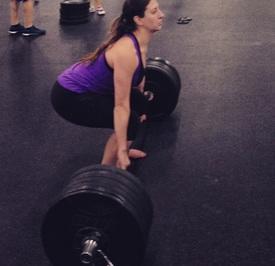Cooking oil vs lard

JaxCreations
Posts: 18 Member
I heard on a cooking program today that lard is actually better for you than oil ?!!?!!?!?!??!
Not sure whether it's right or not, I've always attributed lard to fat.
Not sure whether it's right or not, I've always attributed lard to fat.
0
Replies
-
All oils are fats. Saturated fats are generally more heat and oxygen stable. Saturated fats carbon atoms have 2 hydrogen atoms attached to every isomer and consequently have what's referred to as single bonds, and lard basically fall into this category because it's solid at room temperature even though lard has slightly more monounsaturated fat than saturated.
Cooking oils are generally classified as refined vegetable oils of either mostly monounsaturated or polyunsaturated fats. The refining process renders them more heat stable, otherwise the smoke points are pretty low, much like extra virgin olive oil, so most are refined. The carbon atoms on these fats don't always have 2 hydrogen atoms attached to their isomers so we end up with whats called a double bond and basically makes a kink and a space in the fatty acid chain and the reason they don't go solid. Monounsaturated fat has 1 double bond and polyunsaturated fats have 2 or 3 double bonds which leaves these open areas in the fatty acid chain susceptible to oxidation and free radical activity, not to mention rancidity. Monounsaturated fats are more stable because of this, so that would be my second choice to use for cooking. Polyunsaturated fats are where the omega 3 and 6's are and these should really never be heated, or exposed to light or heat, so basically never use a cooking oil that's predominantly a polyunsaturated fat like soybean, corn, sunflower, safflower et al.
Personally for cooking I use lard, butter, duck fat, pork fat, ghee coconut oil and extra virgin olive oil.......all unrefined as well. Manufacturers know that using polyunsaturated fats are very unhealthy and they are now coming out with higher monounsaturated content of these previously high poly oils before bad press and problems start to arise from bad press I assume.......it's more expensive, who knows maybe they're just merchandizing smartly for the segment of the market that knows this or actually cares, most people don't.0 -
In for duck fat. I'm sadly running low...0
-
Did some one say duck fat?
 0
0 -
You cannot make a genuine real good genuine tasting Mexican Tamale without pork lard. I don't care what anyone says. That is why portion and tamale as a special holiday treat homemade, not an every week meal. And for a pie crust Leaf Lard reigns supreme.0
-
For you.Did some one say duck fat?
Duck confit
Ingredients
4 duck legs, about 3 pounds
2 cloves garlic, peeled and split in half
1 ounce coarse salt
4 peppercorns
2 bay leaves
2 sprigs thyme
5 cups duck fat, melted, more if needed to cover the legs completely
Directions
Rub the duck legs all over with the split garlic cloves and put them in a glass bowl with the salt, pepper, and herbs. Cover with a tea towel and refrigerate overnight or up to 48 hours, turning once.
Heat the oven to 200°F/100°C. Rinse the duck and pat dry with a towel. Set the legs in a baking dish and tuck in the garlic cloves. Pour over enough fat to cover them, place over heat and when you see the first bubble, set it on a rimmed baking sheet in the oven and bake uncovered until the meat is very tender and shrinks away from the bone, about 4 hours. Cool slightly in the fat, then carefully lift them out.
While the confit cooks, soak 2 wooden skewers in a saucepan and boil 5 minutes to sterilize. Lay in the bottom of two sterilized glass loaf pans (breaking the sticks if needed). Lay on the duck legs and ladle over the fat, leaving any juices behind. Make sure they are well covered. Cover with foil or plastic wrap, and refrigerate a week to mellow.
To cook, remove the pans from the fridge and set in simmering water about 20 minutes, so you can pull the legs out without breaking. Heat the oven to 350°F/180°C and lay the legs skin side down with a little fat around them in a cast iron pan. Bake until hot, about 15 minutes. Remove and turn oven to broil. Turn legs skin-side up and broil to crispen skin, about 3 minutes.0 -
Man duck fat, last summer my grandmother and I raised 24 meat ducks. On butchering day she made duck bacon, I collected all of the extra fat I could find (which is the least gross way to explain it), rendered it down and used it to make lyonnaise potatoes. It was worth the six hours of gross.0
-
The French have a saying for potatoes cooked in duck fat and it's called.Man duck fat, last summer my grandmother and I raised 24 meat ducks. On butchering day she made duck bacon, I collected all of the extra fat I could find (which is the least gross way to explain it), rendered it down and used it to make lyonnaise potatoes. It was worth the six hours of gross.0 -
Oh my god, I wish it weren't so hard to find up where I live, or that I knew someone closer than my grandmother who had the room to raise ducks for/with me. Hand raised roast duck with crispy fatty potatoes and fresh asparagus with a little red wine.... It would be worth being fat.0
-
So I'm thinking of trying something here. I'm thinking of using sous vide to confit my dug legs, then give them a hard sear prior to eating.
Seems legit right? throw them in the cooker and come back after a couple days. Boom, lazy *kitten* sous vide, and duck fat efficient. Then from there I was thinking of turning half of the duck confit into rillette.
If that doesn't get me laid... heh0 -
Sounds like a good alternative and should work easily. I would make sure you dry rub the duck legs for a couple of days, then proceed.So I'm thinking of trying something here. I'm thinking of using sous vide to confit my dug legs, then give them a hard sear prior to eating.
Seems legit right? throw them in the cooker and come back after a couple days. Boom, lazy *kitten* sous vide, and duck fat efficient. Then from there I was thinking of turning half of the duck confit into rillette.
If that doesn't get me laid... heh0 -
Ask your butcher, they'll bring it in for you, no problem.Oh my god, I wish it weren't so hard to find up where I live, or that I knew someone closer than my grandmother who had the room to raise ducks for/with me. Hand raised roast duck with crispy fatty potatoes and fresh asparagus with a little red wine.... It would be worth being fat.0 -
I admit duck fat is delicious, but I do like using olive oil
 0
0
This discussion has been closed.
Categories
- All Categories
- 1.4M Health, Wellness and Goals
- 398.2K Introduce Yourself
- 44.7K Getting Started
- 261K Health and Weight Loss
- 176.4K Food and Nutrition
- 47.7K Recipes
- 233K Fitness and Exercise
- 463 Sleep, Mindfulness and Overall Wellness
- 6.5K Goal: Maintaining Weight
- 8.7K Goal: Gaining Weight and Body Building
- 153.5K Motivation and Support
- 8.4K Challenges
- 1.4K Debate Club
- 96.5K Chit-Chat
- 2.6K Fun and Games
- 4.8K MyFitnessPal Information
- 13 News and Announcements
- 21 MyFitnessPal Academy
- 1.6K Feature Suggestions and Ideas
- 3.2K MyFitnessPal Tech Support Questions




